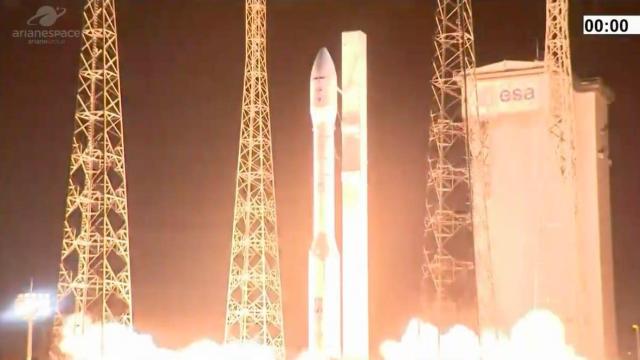An Arianespace Vega rocket carrying two satellites failed to reach orbit yesterday after experiencing a catastrophic failure eight minutes into the launch. Officials are attributing the loss of the rocket to a “series of human errors.”
Vega Flight VV17 started off well, with the 29.87 m-tall (30-metre) rocket departing the Guiana Space Centre at 8:52 p.m. ET. The first three stages, all powered by solid-fuel, did their job, propelling the vehicle and its cargo over the Atlantic ocean toward space. It was when the liquid-fuelled upper stage kicked in that things went sideways.
According to satellite launch company Arianespace, the trouble began around the eight-minute mark of the mission. At that point, the upper stage, called AVUM (Attitude and Vernier Upper Module), correctly detached itself and ignited, in what was supposed to be the first of four consecutive rocket burns. Immediately after the first ignition, however, AVUM went off course, never to recover. The upper stage and its cargo — the Spanish SEOSAT-Ingenio Earth observation satellite and the French TARANIS atmospheric observation satellite — plunged into an uninhabited area, said an Arianespace statement.
“Tonight during the Vega VV17 mission…an anomaly has occurred, which caused a trajectory deviation entailing the loss of the mission,” explained Avio, the Vega rocket’s prime contractor, in a brief statement.
The launch failure, the second for Arianespace in its past three attempts, represents a loss of $US400 ($548) million, reports SpaceflightNow.
Speaking at a press conference earlier today, the chief technical officer for Arianespace, Roland Lagier, said the upper stage entered into an unrecoverable tumble during the primary engine burn, causing it to go wildly off course, as SpaceNews reports. He added that telemetry data from the mission, and also factory production notes, indicated a likely cause for the flight anomaly. It appears that cables connected to a pair of thrust vector control actuators were inverted.
Because these two cables were installed upside down, the commands meant for one actuator were transmitted to the other, resulting in the tumbling action. As Arianespace noted in its statement, “a problem related to the integration of the fourth-stage AVUM nozzle activation system is the most likely cause of the loss of control of the launcher.”
“This was clearly a production and quality issue, a series of human errors, and not a design one,” said Lagier, as reported in SpaceNews.
Arianespace will continue to investigate the incident with the help of the European Space Agency, as the company explained in its statement:
In accordance with their standard protocols, Arianespace and the European Space Agency (ESA) will set up an independent Inquiry Commission jointly chaired by Daniel Neuenschwander, Director of Space Transport at ESA, and Stéphane Israël, Arianespace Chief Executive Officer, on November 18. The Commission will provide detailed evidence to explain why steps were not taken to identify and correct the integration error. The Commission will formulate a road map for the Vega’s return to flight under conditions of complete reliability. Arianespace and ESA will jointly present the findings of this commission.
Arianespace said future launches, including three scheduled for later this year, shouldn’t be affected by this latest setback. Speaking at the press conference, Stéphane Israël, chief executive of Arianespace, said yesterday’s accident is unrelated to the failed Vega launch from July 10, 2019, in which an imaging satellite belonging to the United Arab Emirates was lost. Arianespace attributed that incident to a structural problem with Vega’s second stage, which has since been resolved.
[referenced id=”1126761″ url=”https://gizmodo.com.au/2018/09/russian-space-agency-says-iss-leak-caused-by-human-error-or-deliberate-spoilage/” thumb=”https://gizmodo.com.au/wp-content/uploads/2018/09/05/zgpwsqed8kkjrysoyr2z-300×168.jpg” title=”Russian Space Agency Says ISS Leak Caused By Human Error Or ‘Deliberate Spoilage’” excerpt=”Last week’s air pressure leak aboard the International Space Station was not caused by a micrometeorite, Russian space agency Roscosmos is now claiming, but rather the result of human error, or possibly even a deliberate act of sabotage. Either way, the incident points to poor oversight and lack of quality…”]
Incidents involving space and human errors are rare, but they do happen. Some notorious examples include the loss of NASA’s Mars Climate Orbiter in 1999 due to the engineering team’s failure to convert imperial measurements to metric and a recent air leak on the ISS attributed to shoddy workmanship (or possibly sabotage).
